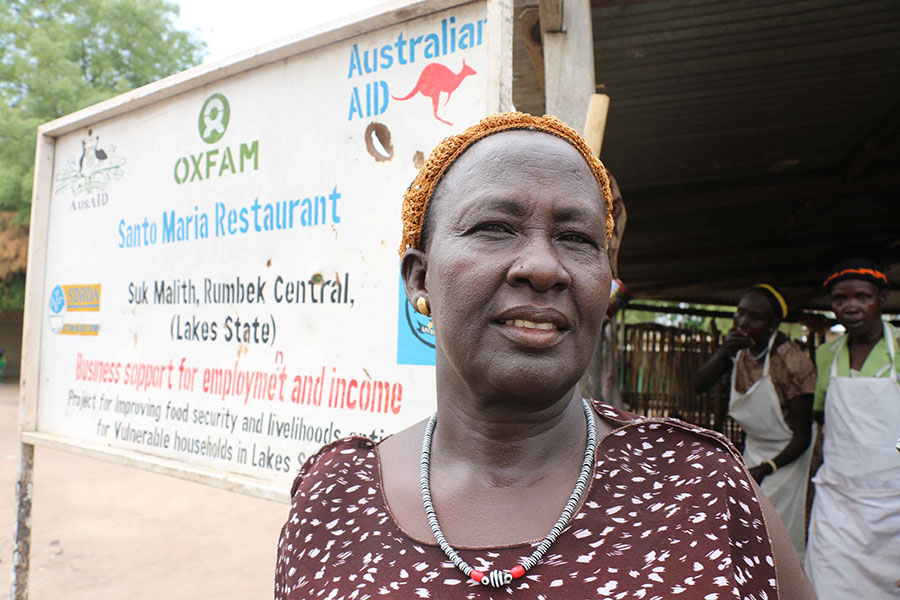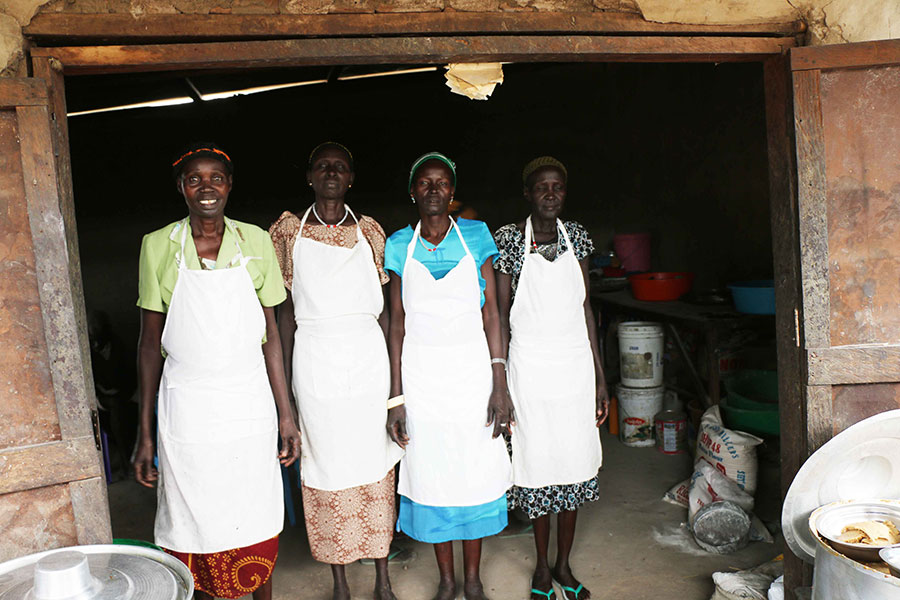
Rumbek, once the capital city of South Sudan, is bustling with activity. Businessmen and women are proudly displaying their goods on the balconies of their shops, hoping to reel in last minute customers.
The sun’s rays are fading fast as Elena, the proprietor of Santa Maria restaurant, and her team prepare for the dinner rush. She is expecting customers in the next half an hour, a few minutes after the livestock market, a walking distance from her restaurant, closes for the day. After a long day of examining livestock and animated negotiations, the traders are always ravenous. This is exactly what she counts on to keep her struggling business afloat.
Fresh, green sun kissed vegetables are being picked and sliced in one corner of the kitchen, while kisra, a traditional flatbread made with fermented sorghum batter, is sizzling and ready to be taken off hot round skillet atop bright red coals. Warm conversation and contagious laughter fill the walls of the restaurant as everyone attends to their tasks, their eyes and ears always peeled for Elenas guidance.
Elena, originally from Rumbek, moved to Khartoum in 2011 in search of opportunities that were lacking at home. After five years, she returned to Rumbek with a renewed sense of hope and a determination to dive into the opportunities the newly formed South Sudan promised.
“This is my home. I had to come back. It was our turn to rebuild ourselves after many years of war,” she says. “Everyone had hope for a better life and a brighter future at that time.”
The women's business support group
After settling back into her old life, Elena decided to fulfil her lifelong dream of running a restaurant. With little capital however, all her ambitions would remain just that. She needed some support to raise the capital to kick start her plans.
“In late 2011, I joined a women’s business support group. At that time, Oxfam was supporting groups like ours with capital and training to start businesses. We received 4,000 South Sudanese Pounds (SSP),” (1310$) says Elena. “We managed the restaurant and saved more than 10,000 SSP (3426$) by 2012. We then divided the money amongst ourselves to each diversify into our own businesses, as was the initial plan.”
The profits from the business were divided amongst the women, but instead of taking her share of the rewards, Elena ventured for a riskier option.
“After some discussion, we agreed as a group that I would take all the assets in the restaurant instead of a share of the profits. It was a risky move, but if I had taken the money and gone home, I would still be at home. Instead I took the materials, used money I had saved personally and borrowed additional capital. It took a long time, and a lot of sacrifice, but I was able to open my restaurant.”

Elena stands outside her restaurant in Rumbek. Photo:Stella Madete/ Oxfam
Starting a new business in Rumbek is not easy, and Elena faced her share of challenges.
“Yes, I had the materials, but rent was very high, and ingredients expensive. It took a long time to find a location that would accommodate my dream at an affordable rate, but eventually I found one in the centre of the busy market. After running my new restaurant for some time, business started to pick up, and all the risk seemed worth it.”
Elena’s business did well for many months but she soon faced the fate currently shared by many South Sudanese people - the depreciating value of the South Sudanese pound. The downward spiral of the economy in south Sudan is affecting many, particularly those that finally realised the dreams they held so dearly when they returned home. Elena hopes for a change of fortune before it’s too late.

Some of Elena's staff at the restaurant. Photo: Stella Madete/ Oxfam
“The cost of running my restaurant has gone up drastically. I used to be able to save the profits I made, but all of it is used to replenish the kitchen stock, pay wages for my six employees and to feed my family. There isn’t enough left to save.”
The price of food in Rumbek has increased at an alarming rate. The price of Kudura, the leafy green vegetable served in Santa Maria, has risen from 3 SSP (1.30$) to 5 SSP (1.70$) in April 2015. Ground nut paste, used to make popular meat and vegetable dishes, was 10ssp (3.50$) this time last year, and is now 30 SSP (10.30$) in the market. A 50kg bag of sorghum flour is now 500 SSP (171$), up from 150 SSP (51$) last year.

A women picking vegetables. Photo: Stella Madete/ Oxfam
“When I try and negotiate with the vendors, they say simply that if I know places where I can buy the same food at a cheaper price, I should go and shop there. Some say that they too have to have to buy food at those prices, and need to increase the price of their goods to do so. The price of a plate of food in my restaurant is now 5 SSP (1.70$), up from 3 SSP (1.30$) a few weeks ago.”
The cost of inflation
Elena has managed to keep her business afloat so far, but with the rising cost of basic commodities, it is difficult to tell for how long she can pull it off. More and more people can’t afford to eat out as the little money they have is used for immediate needs at home. Sky-rocketing inflation, conflict and collapsed markets are pushing people in South Sudan to breaking point. Drastic increases in food prices are putting pressure on already stretched household budgets.
Oxfam livelihood programs in Rumbek supported over 400 people with capital when they needed it. By working with the community they hope to support, Oxfam ensured that the initial capital would result in the long term foundation of sustained growth. The gains made with this support are at risk of being erased due to the grim economic forecast. Experts warn that South Sudan could be heading towards complete economic meltdown unless the government reduces its spending.
Currently the government is spending double the income it makes on a monthly basis, with much of this being spent on security rather than basic services to meet people’s needs. Without peace few other measures are available to help stabilise the economy. But Elena is hopeful and is not easily deterred.
“Things are difficult now, but I am committed to my dream. We have faced challenges before and overcome them. We can do it again. What I want now is for the government to end the conflict and make sure that South Sudanese people are able to support themselves.”